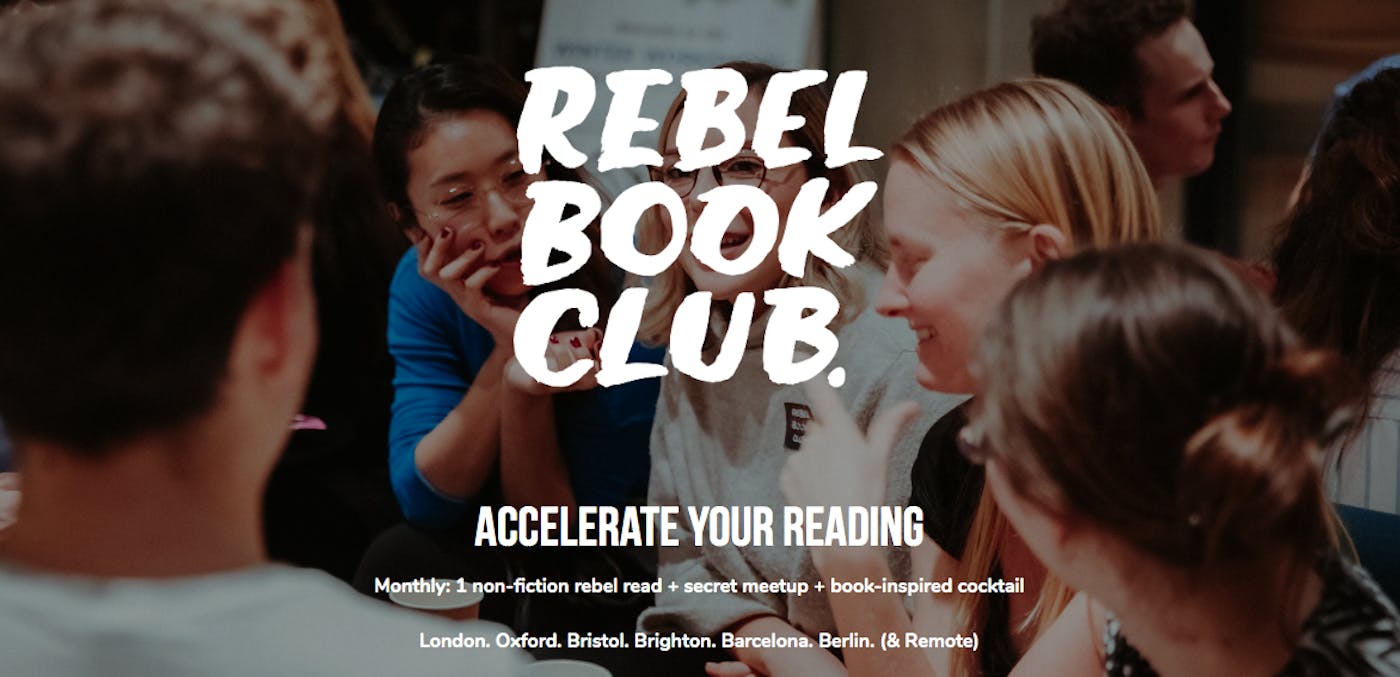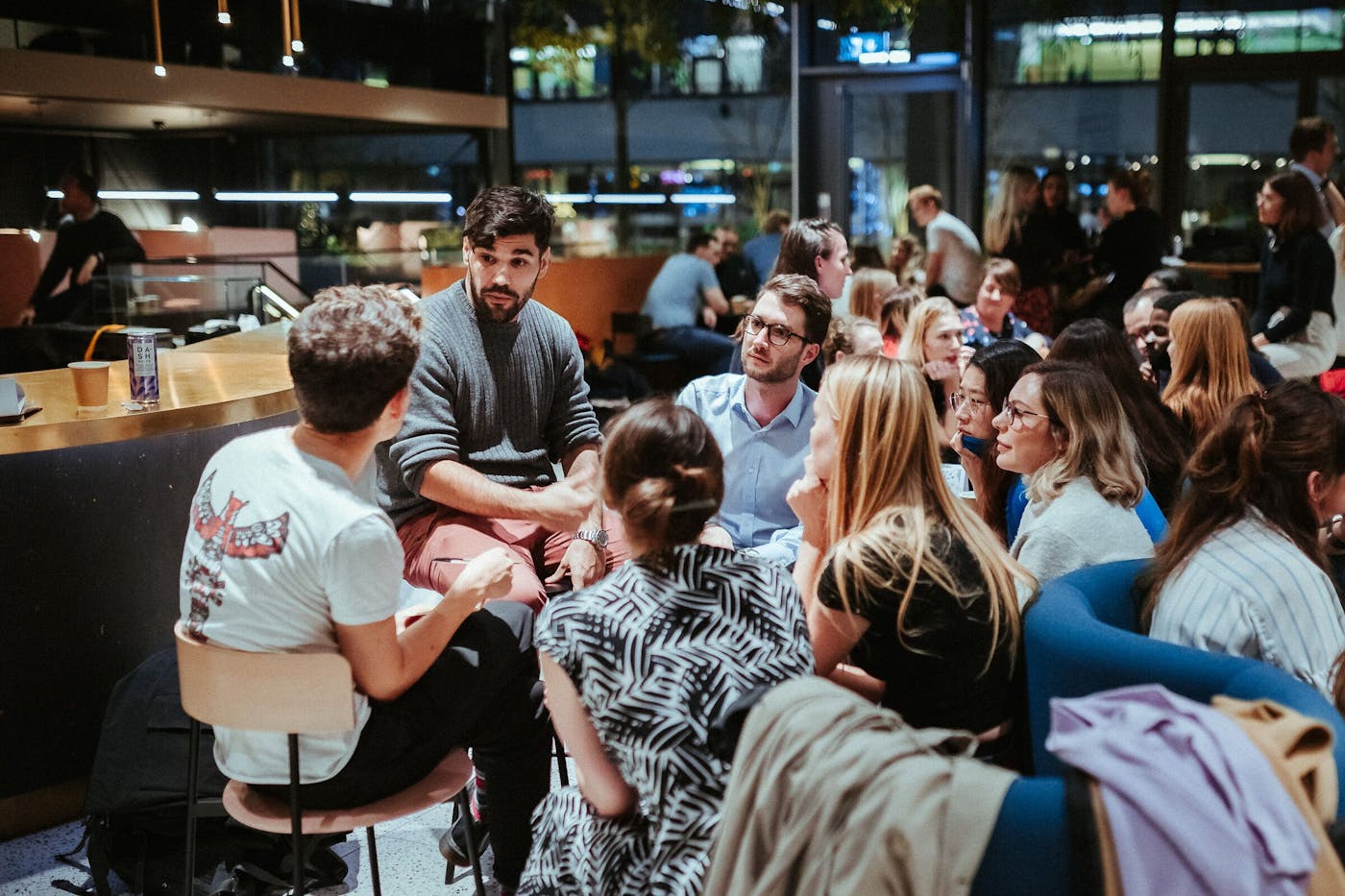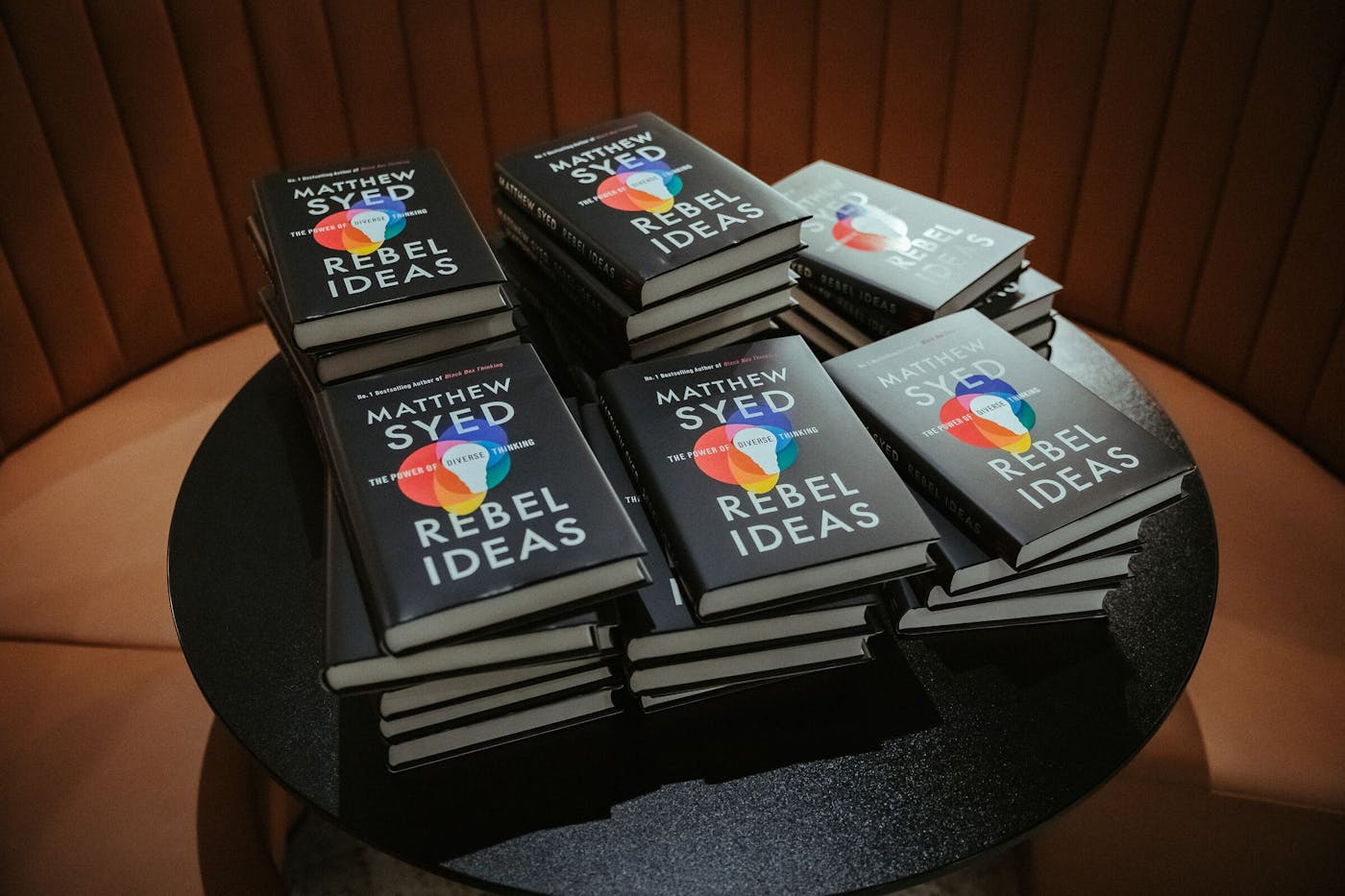How I Built a Thriving Business by Never Planning
Ahead
Hello! What's your background, and what are you working on?
Hi. My name is Ben Keene and I'm the co-founder of Rebel Book Club. I've spent 20 years building startups and communities, including Tribewanted (crowd-funding eco-tourism projects on remote islands) and Escape the City (helping professionals find more fulfilling work).
My co-founder and I wanted to finish more non-fiction books and extract tangible value from what we read. There's a word in Japanese for the pile of never-finished books on your bedside table: Tsundouku, and we were suffering under its curse! We thought it'd be cool to read the same book at the same time with other curious minds. We tested the idea pretty quickly and thought it had enough legs to charge a monthly £15 subscription fee which covers:
- 1 non-fiction book
- 1 inspiring meetup
- 1 custom cocktail inspired by the book, served at the meetup
We launched in May 2015 and had 24 paying members, a number of whom I consider good friends now! Each month my co-founder and I put in a little time to keep things ticking, and the community grew organically month on month. A year later we had 104 paying members and enough leverage to reach out to some bigger authors… and actually get a response.
57 books later, we have 850 active subscribing members with an MRR of $17,000.
What motivated you to get started with Rebel Book Club?
In truth, we didn't have the bandwidth to invest heaps of time into the project. We kept the formula simple and, though it was small, we continued to grow month on month via word of mouth with zero marketing spend. After running a couple of workshops at festivals on "how to get maximum value from badass books" we were asked to speak at a TEDx event.
Things were starting to feel pretty legit.
Our usual distribution channel was via Amazon vouchers, giving members the freedom to redeem Kindle or paperback versions of our monthly book, but we were drawn to distributing physical books a few times. This was partly because we had enough scale to negotiate wholesale prices directly with publishers, and partly because we thought a physical book turning up in a branded envelope could take the member experience to the next level.
We quickly learned that physical distribution for us was increasingly time-consuming and added a heap of customer service challenges if the book didn't arrive as intended. Part of me still thinks one day we may revert back to this method and get it right but for now we decided to leave it to the Bezoses of the world.
Both of us had built and run lean, low-code startups and communities, so that helped keep everything minimal, simple, and focused.
At the time we were both in Bali, and then back in London working on other projects. We didn't take an income from RBC for the first two and half years.
What went into building the initial product?
It probably took two hours a week to start with, and a little more when we held our monthly meet. We'd check inbox twice a week, email new members, send a tweet and an Instagram post, and add books to the list. That was about it.
The assumption we wanted to test was: would people be prepared to pay twice the cost of a paperback or Kindle book to be part of a cool book club. Our target was to find 15 people to spend £15 on a RBC membership within one month.
Our first pitch was a simple webpage built on Strikingly (which we have since used to grow the club and business to the level it's at today, before switching to a Wordpress site next week). Our pitch was, "Not Your Average Book Club > 1 x Non-Fiction Book + 1 x Cocktail + 1 x Secret Meetup."
My co-founder and I shared on our social networks - we're both plugged into the startup community in London - and sent direct emails and messages inviting those we thought might be interested. We used Typeform for our applications and then emailed a GoCardless pay link to those that looked like a good fit. The conversion rate from application (a two-minute form) to payment was over 70%, and in two weeks we had 20 members signed up.

We then looked at buying the book and sending it to everyone, but realised it would take a lot of time and we couldn't compete on fulfillment. Instead, we found that through Amazon we could offer vouchers. We decided to send vouchers for the value of the Kindle book that members could then use to buy the book on Kindle or upgrade to paperback. Our plan was to switch to buying books and shipping after a month or two, but 57 months later we're still using this method as it's easy and popular.
Once the vouchers were sent we set a date for a meetup, emailed a friend who had cool work spaces, and secured the roof on top of Virgin's head office in London. We found a friend who made rum cocktails and hosted our first meetup. Luckily it didn't rain!
Revenue was around £200 and we spent around £120. We were up and running and decided to do it for a second month, and the rest is history.
What's your tech stack?
We've always we used no-code tools.
We started with Strikingly for the landing page (and are only just migrating to a WordPress site this month, almost five years later).
We used GoCardless for subscription payments, Amazon for vouchers, and Typeform for applications and surveys.
Finally, we used social media channels for community; we had a Facebook group initially, and now WhatsApp and Mighty Networks.
We're obviously adding a lot more tools now as we're investing in growth, but it's been very lean. The aim is to simply get us to £100k annual revenue.
How have you attracted users and grown Rebel Book Club?
We grew using our social network for first members, then word of mouth through sharing the story with whomever asked. Our best referral has been Time Out magazine a year ago, which mentioned RBC as a cool book club in London. We still get members weekly because of it!
Church rate/cancellations are always the biggest challenge. People leave because they don't have time to read books or get to meetups, or they're leaving town. We've started offering more flexible memberships, which has reduced the rate a little.
If in doubt we always ask: "What would help our members accelerate their reading habits and make valuable connections in the community?" Then we try and do more of that.
Here's a look at some of our stats from 2019 (vs 2018):
- 🚗 Unique users 21k (7k)
- 📝 Applications 1918 (780)
- 👶 New Members 1020 (450)
- ⛔ Cancellations 626 (230)
- 💭 Meet-up attendees 2120 (775)
- 💷 Revenue £115k (£45k)
- 👸🏽 Active Members 802 (393)
- 🌃 Cities 5 (2)
- 📚 Game-changing books 12 (12)
What's your business model, and how have you grown your revenue?
Membership breaks down like this:
- On average £16/month
- 20% on VAT
- £6.50 average on book voucher
- £2.50 average on meetups
- Remainder on team/ops
Recent crowdfunding has allowed us to start investing in product and growth initiatives for the first time. That said, our margins were healthy before we began hiring.

Our business model is simply a subscription model where members sign up for three months, with three different types of membership:
- Social: For those who want to read every book and go to most meetups
- Simmer: For those who need a bit more flexibility, a book and meetup every other month, when they can or would like to join
- Sofa: For those who want to join remotely, or aren't in our current cities
Average membership is £15 month and includes the book voucher (£5-7), along with an invitation to our meetups. Meetups cost us about £3.50 per person, but only a fraction of our members go to them, so the cost per member is more like £2.
Margin would be around 40% before tax, some of which we'd invest back into the club and then take a small end-of-year payment for those who had run the club.
Until a month ago when we finally started actively working on RBC as a team, we didn't have any staff, VAT, or marketing costs.
Our business model is still profitable, but now we have growth targets rather than simply growing organically. One month in, we're starting to see the impact of more focus on membership and some social ads.
What are your goals for the future?
With funding and now a small, talented team, here's our 2020 vision.
Our first goal and priority is improving the current membership experience. We're doing this by putting more energy into connecting our members so they can accelerate their reading habits (and impact) together and go to other related events and projects. We want the membership to feel like excellent value for everyone, not just some of our members who make the most of it. So it's all about the community.
Our second goal is communicating the value of RBC to a new target audience through a better pitch online (with our new site) and stronger social channels and ads. We'll see the results of this in the coming weeks. We're looking to do this by expanding to more cities and growing our remote membership.
Our third goal is to start supporting literacy projects. We're very fortunate to have the time (and money) to invest into reading more. We're looking to partner with organisations who are tackling literacy problems across our society and exploring ways we could support them on their missions.
Our fourth goal is to build partnerships with organisations and brands who would like to help their teams and communities accelerate their reading habits. We've got our first pitches out in the wild and the first signs are promising.
If you had to start over, what would you do differently?
Not a lot in terms of pacing, keeping it lean, community building, and business model.
I guess the main thing we might have done is to raise funds a bit sooner, but neither of us were ready for that as we were busy with other projects.
I think we could have put more energy into each new city launch to get them to a bigger size more quickly, but we haven't really had the time or resources until a few weeks ago. And now that we do, we are!
Have you found anything particularly helpful or advantageous?
The key things that have made RBC work well so far:
- Low expectations/pressure to be a huge success. We just tried one month at a time with a project mindset
- Responding to member feedback when there's a key theme
- Following our gut instinct just as much as the data
- Having fun: the more we've enjoyed it, the better it's worked!

We also (of course!) have some book recs! And we could recommend so many, but specifically for building this kind of startup:
- To get an idea out in the world: *$100 Startup- or The Doorstep Mile
- A classic business story: Shoe Dog
- How not to do it (but a fun, shocking read): Bad Blood
- The only book you need on marketing: This Is Marketing
What's your advice for indie hackers who are just starting out?
I mostly see people getting blocked by things that are in their heads:
- "Fear of failure"
- "Career suicide"
- "Imposter syndrome"
- "My idea isn't good enough"
All of these are inverted commas because they're our perception rather than a lived reality.
Best way to fight these is to reframe a big idea as a small project, something you're going to try out and see how it goes. Yes, be bold, but also do something! If you want it to get past day three, then have some accountability either with a partner or actual customers/members.
Where can we go to learn more?
I would love to hear from indie hackers about how reading has helped them (and what books!) and if they'd be interested in helping bring RBC to their city.
Thank you for the inspiration and accountability guys!

HR outsourcing (Human Resources outsourcing) entails employing external firms or contractors to oversee particular human resources functions, such as payroll, benefits management, recruitment, and employee training and development. This form of expanded team services can serve as a perfect means of collaboration for IT companies or active projects in development!
Source: https://mobilunity-bpo.com/hire-a-top-email-marketing-consultant-in-2023/
Awesome idea Ben! The idea of reading and clubbing at the same time in the form of meet-ups is revolutionary. There are many book clubs out there but RBC has taken it 10 notches higher by creating communities. Perhaps you can think of annual "come together" once a year for all RBC members all over the world. I run Paradise Bookshops out in Lagos, Nigeria, and looking to RBC for more inspiration. Perhaps you can think of RBC meet-up at Paradise some day.
Love the idea of Paradise Bookshops Paul :)
https://rebelbookclub.typeform.com/to/JAiFPB
Awesome! All I read is nonfiction and I regularly feel like the "weird" guy because of it. I actually have this vivid memory from grade school of not considering myself a reader because I only read magazines and manuals (like... for DOS lol) My mom heard me say something about not being a reader and she was like "What are you talking about?! All you do is read!"
A book that has had perhaps the greatest and longest impact on me was my mom's copy of "Your Money or Your Life". It's like the original 4-hour Workweek! (I liked that book too. :) ) The investing information is outdated, but everything before it is solid. I diligently followed everything in the book and it totally changed up how I saw money. I was already frugal but... that book took me to another level!
Everyone needs a book in their life that transforms their relationship with time and money. Maybe about 15 years after reading the book I was talking to my mom about it like she had already mastered everything in it and she says "Sounds like I better read that." lol
How many interested people do you need in order to launch in a new city? I'd be interested in helping to bring it to Taiwan (Taipei). @8bit currently has a simple Twitter book club of sorts with "The Mom Test" and his one Tweet a week has been forcing me to keep up! It would be awesome to have a club of nonfiction nerds to read (and drink!) with. lol
awesome, thanks for sharing Casey
Add Taipei here (need about 50 really interested to start) > https://rebelbookclub.typeform.com/to/JAiFPB
Thanks for getting back to me! :) Is it cool if I'm proactive about collecting some names? (Like throw together a Google form or something to gauge interest.)
go for it!
Sweet! I'll let you know what happens... :)
seems like a really interesting concept to blend a good old tradition of 'book clubs' with meetups. not sure its necessarily scalable or whether this is the intent, but would definitely see myself subscribing if I lived in the area
cheers! Where do you live, we'll let you know if we come your way :)
Hey Ben! Awesome journey you had with Rebel Book Club, and I'm happy you've got funding now and are focusing more on growth and improvement as revenue increases.
I'm a book fan too and I've had an idea I'm turning into a project: we're building a descentralized library for physical books. It'll be a private subscription-based community where members share their physical books once they finish them and put them up for grabs for anyone that wants to read them. It's basically a book lending community. I'm interested in your opinion on this idea and maybe if you could share it with your own community/followers and see what they think about it!
love the idea.
just figure out riskiest assumption and test on a small/pop-up scale for a day/week
About half the RBC community read on kindles/use audible. Those who buy paperbacks, often they quite like building up their 'shelf' of books , as a reminder of what they've read and go back to them.
Having said that I think they're always up for book swapping and we ran a 'books that changed you' event which was popular.
I like how phone boxes have been repurposed as libraries.
I expect students might be a good target audience to test your idea with
Yeah, students are a good target audience to swap educational books used in university for example.
But the main target audience would be physical book lovers, travelers and minimalists who read a lot and don't really like stacking up piles of books. It's hard though since generally those who buy paperbacks, as you said, like building up their shelves. But they do probably have a few books they'd give away for others to read.